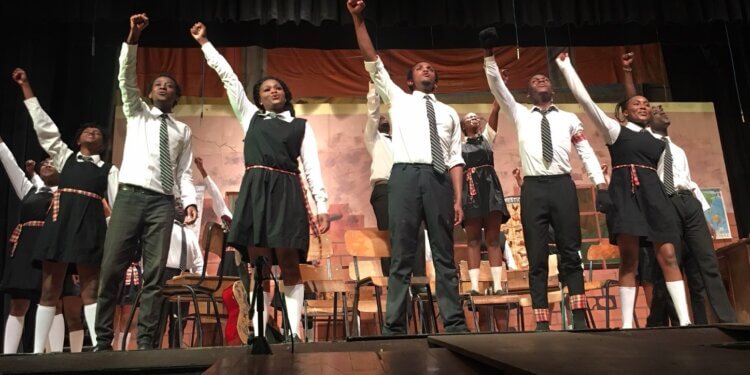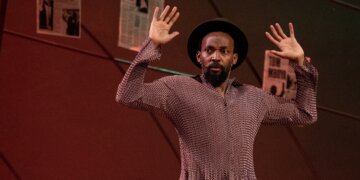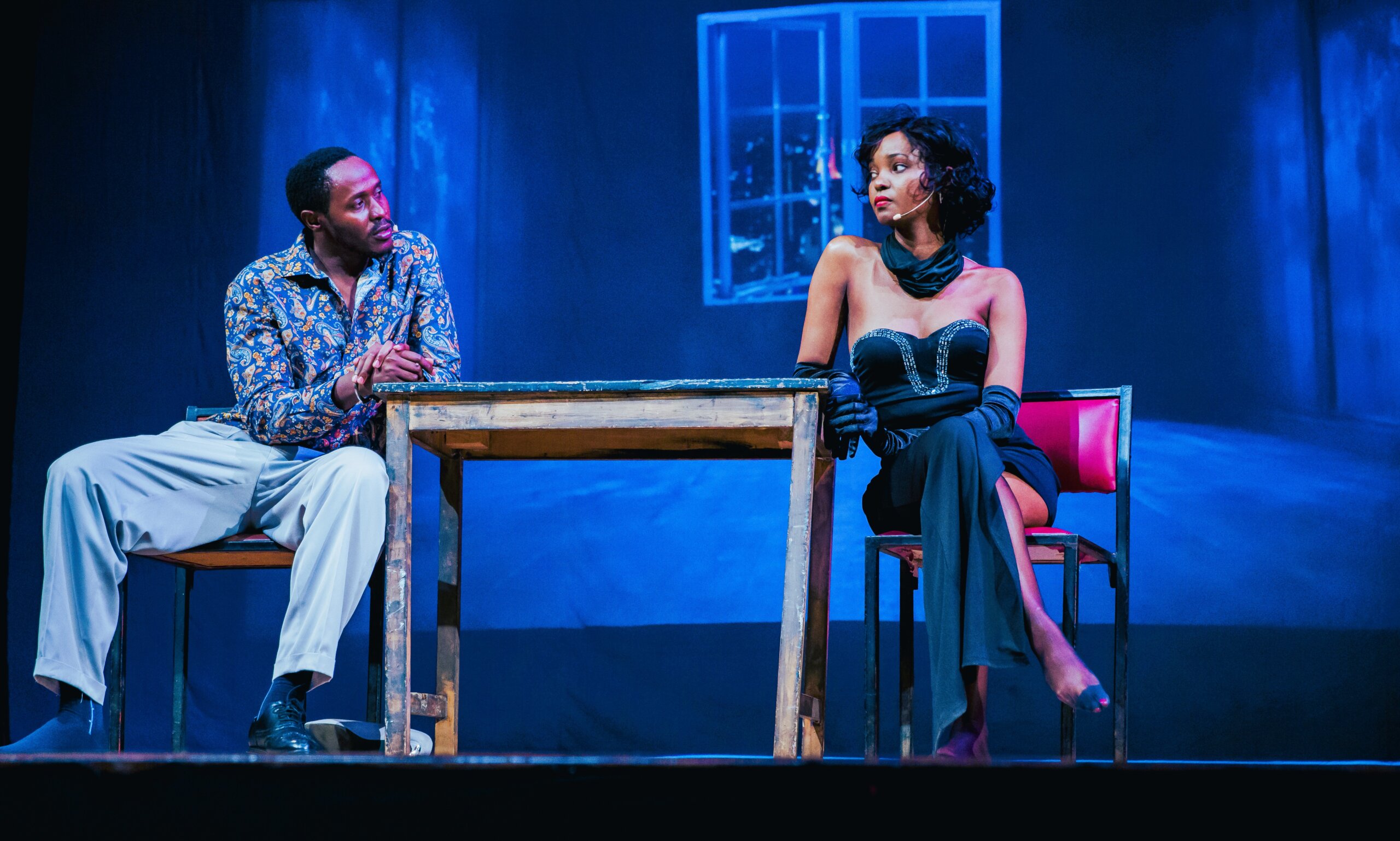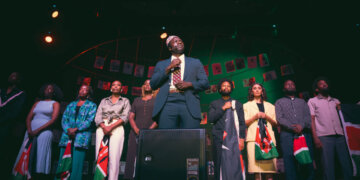A video floods social media on the evening of April 9, 2025. An agitated man sits in his car as heavily armed, mostly masked government security agents buzz around him, turning the spot into a makeshift jail.
“Nimefanya makosa gani?” he barks at a security agent who stares back like he’s facing an alien from the constellation Anti-government Radical. “You’re arresting me because of writing a play?” the man in the car poses rhetorically to the gaping security agent who stands immobile as his master had probably commanded.
The man in the car is Cleophas Malala, the writer and director of Butere Girls’ contentious play Echoes of War. But Malala isn’t just a thespian. He’s also been a politician – a Member of the County Assembly, a senator, a gubernatorial candidate, and the Secretary General of the ruling UDA party – the same regime that now torments him in his car. Just 10 months ago, at the peak of his political power, Malala, like our politicians arrogantly do when it suits them, defended the government’s violent response to the Gen Z protests of June 2024. But as Malala has now learned, no one is safe from the long, murky hands of a corrupt government. One day, it will come for you. Malala now finds himself the unwilling star in a real-life version of a fictitious play he scripted.
More footage surfaces in the early hours of April 10. Students of Butere Girls High School, no older than 15 or 16, stand their ground as armed police officers lob teargas canisters at them. Angry, but braver than they are afraid, the girls live the very reality they’d been rehearsing onstage for months.
They channel the spirits of Kenya’s great women before them, women who spoke truth to power, making a lasting mark in Kenya’s history – Mekatilili wa Menza, Field Marshal Muthoni Kirima, Wangari Maathai, Micere Mugo, Grace Ogot, Chelagat Mutai.
“We’re not performing without our rights,” the girls declare in an act of defiance. They sing the national anthem and walk out. This moment turns out to be the most powerful performance than than anything that could be scripted for the stage.
This isn’t the first time Butere Girls High School has found itself in the government’s crosshairs.
In 2013, their play Shackles of Doom – also written and directed by Malala, then a 27-year-old MCA – was banned from the National Drama Festival for allegedly inciting ethnic disharmony. The courts would later rule to overturn the ban.
Shackles of Doom, in Malala’s words, “depicts the way society has been infested by the unequal distribution of resources. We’re saying it’s time to tackle the bull by the horns. We’re saying we want to uproot the seed of ethnicity…of tribalism.”
Fast forward to 2025, and the story repeats. In March, the government struck again, banning Echoes of War from this year’s National Drama Festival. Colloquially dubbed the ‘Gen Z play’, according to The Standard Newspaper, it “imagines a nation recovering from a civil war, where young citizens are at the forefront of rebuilding efforts, with the characters fighting for better healthcare, education, and justice systems…”
The synopsis reads: “This play is a hyperbole attempt to illustrate the widening gap between two generations; the old and the young. The artistic context is set in the Royal Velvet Emirates, a fictitious kingdom in the Middle East. In this kingdom, the old have quickly lost trust of the younger generation. The young are agitated by the inflexible strictness of the old.”
This time, the government didn’t even bother to offer a justification. But we can all guess what happened: someone in power didn’t like what the play was saying, and so it had to be silenced.
Founded in 1916 by Irish Anglican missionary Jane Chadwick, Butere Girls has been a towering force of excellence in and out of theatre halls. Prominent women have worn the red skirt and later influenced the cultural and socio-political world, from the late flamboyant Ambassador Orie Rogo Manduli—fashion icon, journalist, and top-rate diplomat of her time to Lady Justice Joyce Aluoch—the first Kenyan judge at the Hague and Professor Julia Ojiambo— the first woman MP in Western Kenya, among others.
But one name has become nearly inseparable from the school’s legacy in theatre – Cleophas Malala – who neither wore the red skirt nor graced its academic walls, but whose searing pen has rubbed the government the wrong way, not once, but twice.
Even before he took the political stage, Malala was already the most sought-after playwright and director for top performing schools across Kenya. The Kenyatta University Theatre Arts and Film Technology graduate has cultivated a distinctive style with layered poetic language, satire, musicality, and local idioms, creating stories that entertain while interrogating society.
From Shackles of Doom (2013) to Godless (2012) —the national winning title presented by Riara Academy – and now Echoes of War, Malala has used theatre as a sharp mirror to society. And while his political career may be floundering, his pen remains trenchant, holding nothing back in its critique of government and power.
This is the man who once said in an article for The Star, “Our road ahead will go far… I’m optimistic that we are going to do better. We dared to dream.” Of course, this was part of his concession speech after losing the 2022 Kakamega County gubernatorial seat, and he was talking about his political future, but he might as well have been referring to the future of theatre, which remains in the chokehold of government interference and censorship today just as it was at the birth of our nation.
Before Butere Girls, there was Musingu Boys whose play Coup D’etat was banned in 2002 for being “too embarrassing” to the government before it was reinstated three years later.
You see, from its invention millennia ago, theatre has never been just about telling stories for fun. Plays are a powerful tool for spreading ideas. In the essay Theatre of Protest: The Magnifying Effects of Theatre in Direct Action, academic and activist Aidan Ricketts writes: “The first act of imagination of any social change activist is the vision of a better world. The next challenge is to imagine ways to convey this imagined vision to others.” Ricketts further posits that theatre is not just an option medium for political protest or societal critique but a necessity—” indispensable” is the word he uses.
Across centuries, the stage has always been political. In 17th-century Britain, satirical plays like John Gay’s The Beggar’s Opera poked fun at the politicians who didn’t find the public’s laughter at their expense particularly amusing. In ancient Greece, Aristophanes often fell off with the Greek elites due to his comedy plays like Lysistrata and The Frogs, which harnessed sharp wit, engaging satire, and bold use of parody to critique Athenian society and politics.
Kenya’s first post-independence government led a swift and severe crackdown on theatre performances deemed to carry “subversive” messages that “undermined” the spirit of national unity. Government spies would routinely mingle with unsuspecting audiences in theatre halls and makeshift venues to identify dissident activities. Some of the most affected plays in this era were the politically charged The Trial of Dedan Kimathi (1976) by Ngũgĩ wa Thiong’o and Micere Mugo, and Betrayal in the City (1976) by Francis Imbuga.
In the essay Writers in Politics, Ngũgĩ reports that the two plays could not be staged for more than four days at the Kenya National Theatre in October 1976 even though they were the official Kenya’s entry to Festac ‘77— the landmark Pan African arts and culture festival held in Lagos in 1977.
Beginning with Ngũgĩ’s I Will Marry When I Want, the Kenyatta-era crackdown on so-called “unpatriotic performances” became increasingly frequent. The play’s leftist language riled up Jomo Kenyatta, who earlier in the decade had sacked and even jailed members of his own cabinet for espousing similar socialist ideals. Determined to purge what he viewed as extremist and dogmatic positions, the president moved swiftly. In 1977, I Will Marry When I Want was banned, and Ngũgĩ, along with his co-author Ngũgĩ wa Mĩriĩ, was arrested and detained, “without even the doubtful benefit of a trial,” as Ngũgĩ would later write.
This government’s censorship has extended beyond the big stages like Kenya National Theatre into high school and college drama circles. It begins with the selection of literature texts. The ruling class ensures that only plays palatable to the regime of the day are taught and examined. As a result, many African playwrights who confront contemporary issues like corruption, neo-colonialism, and tribalism are sidelined in favour of European works that explore foreign issues, ideologies, and cultures, experiences often alien to local students.
So instead, we see the William Shakespeares, Bertolt Brechts, and Henrik Ibsens of the world bequeathed the honour of being primary play texts, while our own Ngũgĩ wa Thiong’os, Francis Imbugas, and David Mulwas — great Kenyan authors — are sidelined, despite deserving a central place in our schools
In his preface to The Black Hermit (1968), Ngũgĩ notes, “… in some schools, an annual production of Shakespeare with African boys dressed in the costumes of sixteenth-century England, has become – like Speech Day – a ritual.”
In a Daily Nation article published on January 30 1982, Livingstone Njomo Mairura writes: “Since 1978 when the leading East African writer, Ngũgĩ i wa Thiong’o was detained, there has been a systematic withdrawal of African authors from the prescribed list, especially those Kenyan authors whose writing appear “to champion the cause of the peasants”.
But the Kenyan government — past and present — has never been content with merely censoring what’s read in classrooms; it casts an even broader shadow over what’s performed on the stage. One of the earliest plays to face the government’s censorship and eventual axe was Muntu, written by Ghanaian academic, playwright, and thespian Joe de Graft. The play explores Africa’s history, philosophy, economics, and culture — from the continent’s mythical origins to the slave trade, colonialism, the fight for independence, and post-independence civilian and military dictatorships
First staged in November 1975 at the Kenyatta International Conference Centre, Muntu featured a cast of Kenyatta University students and staff, many of whom would go on to become towering figures in African theatre. The cast included de Graft himself — already regarded as a monumental figure in African literature — as well as Francis Imbuga, Arthur Kemoli, David Mulwa, John Sibi-Okumu, and several others.
Originally slated for a 12-day run, the production was suspended by the government after just two days. “The explanation for the action is that the play is violent and that violence does not conform to our way of life,” reported a Daily Nation article in 1982.
A lot has happened since that powerful (and unfortunate) day on 10 April when Butere Girls students stood their ground and refused to be silenced. In the aftermath, there have been spins from the government and the Ministry of Education, each one more absurd than the last, from the school being accused of flouting Teachers Service Commission regulations by hiring a non-teacher like Malala to claiming political interference to even more disturbing allegations of predatory and pedophilic behavior thrown at Malala.
But come what may, the stage has never been just a platform for entertainment. The stage has always been a battleground. Theatre is resistance. Theatre is protest. It stands as a testament to the resilience of human creativity.
Already, a collective of Kenyan artists is working to bring Echoes of War to its biggest stage yet — Nairobi’s Uhuru Park. Meanwhile, Bryan Ngartia, co-founder of the theatre troupe Too Early for Birds, is hoping to bring back Kifo Kisimani to the stage. Written by Kithaka wa Mberia, Kifo Kisimani is a political allegory set in a society marked by oppression, betrayal, and silence – where truth is dangerous, and justice is elusive.
Enjoyed this article?
To receive the latest updates from Sinema Focus directly to your inbox, subscribe now.











